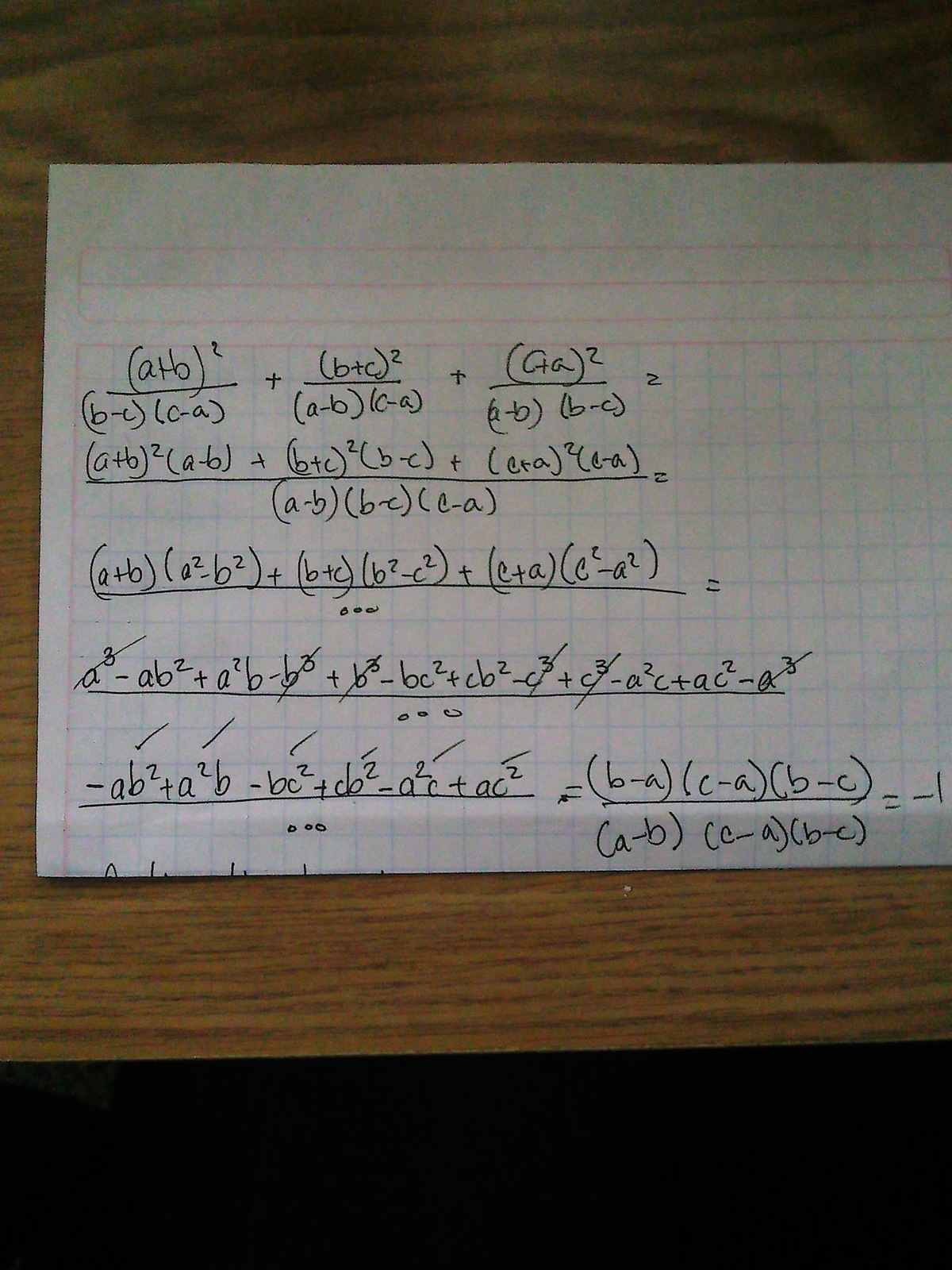Simplify this easy expression. It came in NSTSE 2015 Class 9 WB
If a , b , c are distinct numbers, find the value of
( b − c ) ( c − a ) ( a + b ) 2 + ( a − b ) ( c − a ) ( b + c ) 2 + ( a − b ) ( b − c ) ( c + a ) 2 .
The answer is -1.
This section requires Javascript.
You are seeing this because something didn't load right. We suggest you, (a) try
refreshing the page, (b) enabling javascript if it is disabled on your browser and,
finally, (c)
loading the
non-javascript version of this page
. We're sorry about the hassle.
5 solutions
@Nihar Mahajan "Since the expression is 'constant' for all numbers a , b and c ." Btw upvoted !
@Nihar Mahajan Same method..!! :D
How can you tell that the given expression is constant for all numbers? On the other hand, what does "... the given expression is true for all numbers" mean? That is not even a statement, therefore, there is no way it can hold true or false.
How you can make sure the last equation comes to (b-a).(c-a).(b-c)?
Is this a basic algebra? I did'nt know that.
Log in to reply
Hey, you don't need to do that... Just expand the lower term, i.e., (a-b).(c-a).(b-c)...
Log in to reply
i assume you have that feeling, feeling that the alphabets could be ingnored so you expand the lower term
Try factoring (by grouping), that should be basic Algebra.
i did it same way....
Just plug in a=1, b=2, c=3 and evaluate.
I like ur solution. Fastest way possible
The numerator will be f(a,b,c)=(a+b)²(a-b)+(b+c)²(b-c)+(c+a)²(c-a). This function is a quadratic polynomial in a, b or c variable (note that each quadratic term will be cancelled). Doing b=a, f(a,a,c)=(a+c)²(a-c)+(c+a)²(c-a)=0. Doing c=a, f(a,b,a)=0 and finally doing c=b, f(a,b,b)=0. So f(a,b,c)=k(a-b)(b-c)(c-a). Take f(-1,0,1)=-1-1=-2=k(-1)(-1)2 <--> k=-1 so f(a,b,c)=(-1)(a-b)(b-c)(c-a) and the whole expression will be reduced to -1.
Also, realize that f(a,b,c)=f(b,a,c)=f(a,c,b)=f(c,b,a). Then if (a-b) is a term, (a-c) and (c-b) will be too. Doing a=b would be enough if that symmetry was perceived.
Answer : -1. Solution : (a+b)^2 / (b-c)(c-a) + (b+c)^2 / (a-b)(c-a) + (c+a)^2 / (a-b)(b-c): = (a+b)^2 (a-b) + (b+c)^2 (b-c) + (c+a)^2*(c-a) / (a-b)(b-c)(c-a). -> (a+b)(a+b)(a-b) + (b+c)(b+c)(b-c) + (c+a)(c+a)(c-a) / (a-b)(b-c)(c-a). -> (a+b)(a^2-b^2) + (b+c)(b^2-c^2) + (c+a)(c^2-a^2) / (a-b)(b-c)(c-a). -> a^3-ab^2+a^2b-b^3 + b^3-bc^2+b^2c-c^3 + c^3-ca^2+c^2a-a^3 / (a-b)(b-c)(c-a) -> -ab^2+a^2b-bc^2+b^2c-ca^2+c^2a / (a-b)(b-c)(c-a). -> (b-a)(b-c)(c-a) / (a-b)(b-c)(c-a). -> (b-a) / (a-b) = -1.

Since the given expression is true for all numbers ,
Let a = 2 , b = 1 , c = 0 .
Hence the given expression becomes :
( 1 − 0 ) ( 0 − 2 ) ( 2 + 1 ) 2 + ( 2 − 1 ) ( 0 − 2 ) ( 1 + 0 ) 2 + ( 2 − 1 ) ( 1 − 0 ) ( 0 + 2 ) 2
= ( 1 ) ( − 2 ) ( 3 ) 2 + ( 1 ) ( − 2 ) ( 1 ) 2 + ( 1 ) ( 1 ) ( 2 ) 2
= − 2 9 − 2 1 + 1 4
= − 5 + 4 = − 1